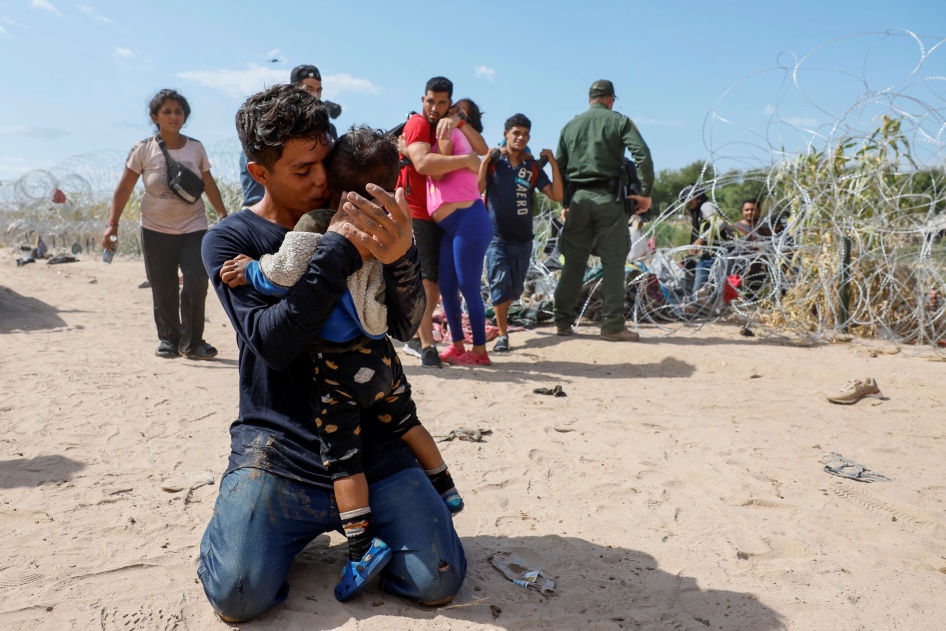(Washington, DC, January 11, 2024) – The United States government adopted important rights-respecting policies in 2023 but these policies did not reverse the overall deteriorating human rights situation in the country, Human Rights Watch said today in its World Report 2024.
“The US government made headway on some human rights issues, but there needs to be a stronger commitment to racial justice, economic justice, and the rights of immigrants and asylum seekers,” said Tanya Greene, US program director at Human Rights Watch. “Democracy faces significant threats, migrants are dying preventable deaths at the southern border, and Black and other communities of color still endure systemic racism.”
In the 740-page World Report 2024, its 34th edition, Human Rights Watch reviews human rights practices in more than 100 countries. In her introductory essay, Executive Director Tirana Hassan says that 2023 was a consequential year not only for human rights suppression and wartime atrocities but also for selective government outrage and transactional diplomacy that carried profound costs for the rights of those not in on the deal. But she says there were also signs of hope, showing the possibility of a different path, and calls on governments to consistently uphold their human rights obligations.
The US Supreme Court issued several decisions aimed at protecting voting rights. However, lawmakers across the country still sought to impose restrictions on voter access. They also continued to undermine democracy with book bans and censorship of academic conversations about race, history, sexual orientation, and gender.
Many US states introduced or passed laws that restrict access to reproductive care and diminish the rights of lesbian, gay, bisexual, and transgender (LGBT) people.
US policies failed to address systemic human rights issues, underscoring the need for comprehensive reforms. After two years of landmark declines in poverty, due to expanded social protection programs in response to the Covid-19 pandemic, the poverty rate rose after the federal government ended pandemic safeguards like the expanded child tax credit. The US Supplemental Poverty Measure rose dramatically, from 7.8 percent in 2021 to 12.4 percent in 2022. Rising poverty rates also exacerbated economic inequality and the racial wealth gap.
Despite some reductions in incarceration rates for Black people, they remain vastly overrepresented in jails and prisons. This trend persists as widespread calls to reduce excessive policing in communities through investments in health and safety needs were overshadowed by demands for increased police funding and the reversal of previous reform efforts.
At the end of 2021, H.R. 40, a bill to study possible reparations for slavery, stalled in the US House of Representatives. In 2023, Rep. Sheila Jackson-Lee of Texas reintroduced H.R. 40 in the 118th Congress but made no headway. In May, Rep. Cori Bush of Missouri introduced a new resolution to study and make recommendations on reparations, but it did not get a hearing.
Under the harsh summary expulsion policy known as Title 42, the administration of President Joe Biden turned away more than 2.3 million migrants without screening for asylum needs. In June, Texas Governor Greg Abbott ramped up his brutal “Operation Lone Star” border enforcement program, installing razor wire and large floating buoys and circular saws in or near the Rio Grande River at the border to prevent crossings. State law enforcement forces were reportedly ordered to push asylum seekers, including children, back into the river.
The Biden administration’s record on human rights in its foreign policy was mixed. It pursued accountability abroad by imposing targeted sanctions on human rights abusers in Sudan, Haiti, and Russia. It also began sharing evidence of international crimes in Ukraine with the International Criminal Court. The administration also implemented new policies to reduce civilian harm by US military forces.
US arms transfers to Israel during the Gaza hostilities violated US policies that condition military aid on ensuring that partners adhere to international law. The administration did not take steps to promote accountability in Ethiopia despite its formal determination of war crimes during fighting there. In June, Biden honored India’s prime minister with a state dinner despite increasing human rights violations by the ruling party and its supporters.








